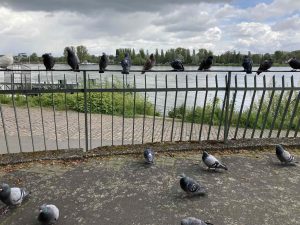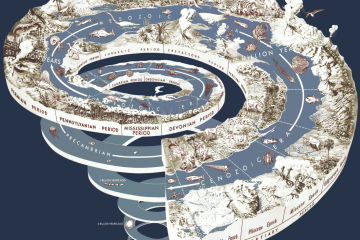Introducing “Mitwelt” Ethics

We’re in the midst of a planetary transformation that needs new ideas and new languages for building healthier relationships between humans and the nonhuman worlds. In recent years, a new way of thinking has taken hold in the sciences and the arts that challenges the primacy of human beings. What I call the “relational turn” has transformed our understanding of concepts such as “agency,” “entanglement,” or “kinship.”
In my new book, Nach der Ausbeutung: Wie unser Verhältnis zur Erde gelingen kann (“After Exploitation: How We Can Build a Healthy Relationship with the Earth,” an English version is in preparation), I’m trying to introduce the main features of the relational turn to a wider audience, while at the same time discussing the concrete implications of this turn for education, politics, economics, and society at large. One problem we need to address is the conceptual isolation of human beings from the rest of planetary life. The term “nature” doesn’t help, because it implies the distinction between “nature” and “culture” that has led to the mess we’re in today. Many people therefore favor the term umwelt, which was introduced by the zoologist (and totalitarian thinker) Jakob von Uexküll more than 100 years ago. Here, the German word umwelt (literally, “the world around us”) refers to the idea that every organism is a perfected life form that has developed precisely those characteristics that are necessary for interacting with and shaping its lifeworld.
A relational view of the world, however, goes further than that. It argues that our being and our knowledge are only possible because we are of this world and not distinct from it. In other words: Relational becoming happens only with the world. This is why the term umwelt is misleading; it assumes that there is a world that exists around us and thus separate from us. Like “environment,” the term umwelt still conveys the idea that we, as human subjects, perceive and understand the world around us as an object.
I therefore suggest replacing the term umwelt with another term taken from the German language: mitwelt. Literally, mitwelt means “with-world” or “the world we’re with.” In a mitwelt philosophy there is no center, no hierarchy of knowledge, and no criterion for evaluating a higher or lower ranking of life forms. There are only nodes in a living network of actors who contribute their respective worlds and perspectives. It is these nodes that matter, for it is here that different perspectives of the world will be perceived and integrated into a full ecology of knowledge and action. The mitwelt concept has some overlap with what Eduardo Viveiros de Castro, in critical reference to European philosophical ideas, calls perspectivism.
How, then, can we describe the basic ideas of a mitwelt ethics?
Let us begin with the positions that we must abandon once and for all: positions that include any attempt to establish a hierarchy of development and value in living communities, usually with the intention of emphasizing the status of humans as superior to all others. These forms of discrimination against nonhuman beings (“speciesism”) also include the assumption that the kind of rationality inherent in humans (even if it is accompanied in practice by affects and emotions) is a superior characteristic of humans and, moreover, must be regarded as indispensable for ethical action.
Once we have abandoned these positions, we can formulate a mitwelt ethics in positive terms: Human beings are part of ecologies of nonhuman agency. In these communities of life there is constant communication, an exchange of information and knowledge that goes far beyond the limits of human language. The intelligence of agential systems lies not in the contributions of individual members of these systems, but in the relational communication of the system as a whole. Meaning and sense emerge from the encounter and interweaving of positions and perceptions that are constantly changing and adapting in reciprocal exchange.
Relational becoming is a fundamental characteristic of mitwelt systems, and this applies to all members of the planetary community, regardless of whether these actors are sentient or have developed certain cognitive abilities. Other special characteristics of individual members—exceptional flying abilities, outstanding olfactory sensitivity, unimaginably long life expectancy, and much more—are also important for the lifeworlds of groups and individuals, but they do not represent a criterion for evaluation in comparison to other actors.
In its non-anthropocentric orientation, mitwelt ethics has many overlaps with biocentric and ecocentric ethics. However, there is one important difference: mitwelt ethics has no center at all, which is why it cannot be biocentric or ecocentric. In mitwelt ethics, there are only nodal points at which the agencies of the various members of the community contact and influence each other. It is at these points that the realities of life in the system as a whole are decided, as well as the content and form of our knowledge about the world we’re part of.
Mitwelt ethics also has much in common with certain forms of virtue ethics. To make this work, however, one must get over the prejudice that true virtues can only develop in human beings. When we think of qualities such as honesty, selflessness, or perseverance, many actors immediately come to mind that are not members of the human species, from stones and trees to fungi and animals. These can serve as teachers or role models across species. Kyle Powys Whyte explains this with reference to the role of sturgeon in the spirituality and science of the Indigenous communities of the Great Lakes region of North America.
What mitwelt ethics boils down to is the extension of the moral community—the group of entities we need to justify and explain our behavior. The status of membership in a moral community gives rise to opportunities for influence and intrinsic rights. Since there is no reason to value the interests of certain individuals or groups more highly than those of other members of the community, the overall system must be designed in such a way that all members can state their interests and contribute them via the nodes of the network. For humans, this means not only making nonhuman agency visible, but actively recognizing and inviting it.
Consequently, it is not enough to simply assume what the interests of these individuals and groups might be. What is needed is full participation in the processes of knowledge and political-social action.
The legal and political representation of nonhuman entities is much more than “environmentalism” or “ecology”—it is part of what Bruno Latour calls the “socialization” of nonhuman beings. These “objects” can also make their own judgments. Hence, what is at stake here is a full emancipation of the nonhuman, which Gregory Cajete from an Indigenous perspective describes as “natural democracy” (p. 168).
We’re far from establishing a mitwelt democracy. But we have a roadmap that can guide us into a future of planetary togetherness.
#
Kocku von Stuckrad is one of the co-founders and co-directors of Counterpoint: Navigating Knowledge. As a Professor of Religious Studies at the University of Groningen (Netherlands), he works on the history of religion, science, and philosophy in Europe and North America. His most recent books are Nach der Ausbeutung: Wie unser Verhältnis zur Erde gelingen kann (Europa Verlag; English translation in preparation) and A Cultural History of the Soul: Europe and North America from 1870 to the Present (Columbia University Press). He lives in Berlin.
Counterpoint blogs may be reprinted with the following acknowledgement: “This article was published by Counterpoint Navigating Knowledge on 14 October 2024.” The views and opinions expressed on this website, in its publications, and in comments made in response to the site and publications are those of the author(s) and do not necessarily reflect the views and opinions of Counterpoint: Navigating Knowledge, its founders, its staff, or any agent or institution affiliated with it, nor those of the institution(s) with which the author is affiliated. Counterpoint exists to promote vigorous debate within and across knowledge systems and therefore publishes a wide variety of views and opinions in the interests of open conversation and dialogue.
Photo credits: “Pigeon People and Rhine in Mainz,” © Kocku von Stuckrad 2024.



0 Comments